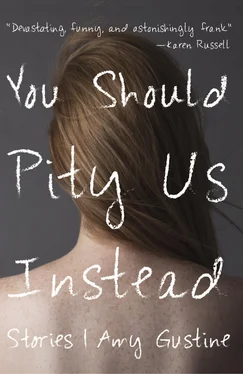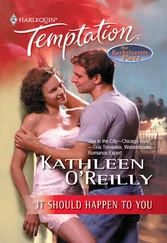Sarah scowls. “Did you wake him up?”
Beatrice shakes her head. “He was crying and you weren’t here. I had to get him out of his crib.”
“Did you drop him?”
“He was crying because you left.”
Ah, Sarah thinks. Smart girl. Knows how to turn things around. But so does Sarah. “He was crying because you panicked. I’m gone a few minutes and you panic.”
“I didn’t panic.” Beatrice looks both defiant and ashamed.
“I was just in the backyard. Did you even look out the window?”
Pause. “Yes. You weren’t there.”
She’s lying, yet it’s Bea’s truth now. The narrative she will continue to tell herself. And her mother probably. Sarah’s chest tightens again. By four p.m. today she needs a more compelling narrative for Bea to pass along.
The narrative she provides is pain and pleasure.
Grayson sits in his highchair, swirling fingers in the crushed, seedy remains of raspberries, which he eats by the carton, as if they weren’t a dollar an ounce. It seems unlikely, but Sarah remembers picking raspberries with her mother. Unlikely because they had no car, so they must have gone with a friend. Sarah remembers only a few first names. Barb. Joan. Mindy. Without last names, there is no way to claw back the years.
With Bea back at her Play-Doh bakery, Sarah takes the baby outside and sets him near the bees’ nest, glancing around to be sure she’s unobserved before prodding it with a stick. When several bees emerge, she traps two in a glass jar laced with sugar water, then slides the lid of the jar away and presses its mouth against Grayson’s bare back, tapping hard on the bottom to startle the bees. To her surprise it works and one of the bees stings the baby. He lets out a wail that tumbles into gulping sobs.
Sarah pulls out the stinger, then rubs the wound, pressing hard enough to distract the nerves. “Oh, I’m sorry. I’m sorry,” she tells the baby. “I had to do it. I had to.”
Inside she shows Beatrice. “Stay away from the back of the garage. There’s a bees’ nest in the ground. One of them stung your brother.” The red circle with its center puncture has already bloomed to two inches. While Grayson wails and Beatrice sits beside him singing, “It’ll be okay, it’ll be okay, my baby,” Sarah makes an ice pack and applies it to the baby’s back.
Slowly, his crying diminishes and Sarah turns to Beatrice. “Do you want to make some real cupcakes?”
“It took no time at all to spot him,” Melanie tells Sarah.
They’re in the kitchen, Sarah washing frosting fingerprints from the cupboards while Melanie pretends to make headway on the counters. Long smears mixed with sprinkles and Red Hots — which Beatrice inexplicably adores — Pollock the white marble, but Melanie is only pinching individual candies, making no real progress, in an attempt to protect her silk blouse.
Bea greeted her mother nearly quivering with excitement—“Grayson almost died!”—and Sarah quickly intervened.
“A bee stung him. You have a big nest in the backyard. I iced the spot and watched him carefully. He had no trouble breathing, and the swelling was very slight. I gave him a dose of Tylenol for the pain.”
Melanie is pleased at her handling of the crisis. “I knew you were the one for us.”
Now Grayson is playing with some pots and plastic spatulas, Bea has taken herself off and Sarah knows she’s gotten away with it. There will be no mention of her disappearance. She applies another squirt of soap to the sponge and waves Melanie off.
From the safety of a counter stool, Melanie continues her story about a student. “He’s one of my Ethans.” There are three in her class, the name’s popularity having surged at the turn of the millennium. Melanie considered it herself, she tells Sarah, but aware of name contamination — every teacher develops strong associations with previous students that ruin otherwise good names — she chose Grayson instead. “Because it’s my dad’s name, I knew I’d always love it.”
Ethan K. is new at school and Melanie declares, “He’s going to be my problem kid.”
She ticks off the “flags” she found in his file. #1: He lives in an apartment on Moss Road. #2: No father listed. #3: Only one emergency contact listed, a man’s name, and under “Relationship” it says “friend.”
“Today I kept him in because he’s behind in language, so I have him there trying to squeeze out a paragraph about his summer, and I find out he’s alone all the time. His mother ‘works.’” Melanie does air quotes. “Okay, so has she ever heard of a babysitter? Or summer camp? I asked what he did all day and he says he plays his Nintendo DS. Lovely, right? No wonder he can barely eke out an English sentence. And he eats peanut butter sandwiches every day for lunch.”
“They’re filling, and cheap.”
“Right.” Melanie rolls her eyes.
As she details the many angry outbursts Ethan K. has had in the weeks since school started, Sarah realizes it could have been her fourth-grade teacher, Mrs. Schuppe, who reported her mother. She’d always assumed it was the neighbor, Mrs. Zabik, because she left the door to her apartment open, would have seen Sarah’s mother coming and going, and her mother had often warned Sarah not to give Mrs. Zabik any information. “Anything you say can and will be held against you.”
But what about Mrs. Schuppe and the teachers before her? They knew of all those days missed, heard her mother’s excuses. A rash. A doctor’s appointment. A family reunion. Or maybe Sarah herself told Mrs. Schuppe something incriminating. Listening to Melanie, she learns again what she already knew: everywhere, by everyone, things can and will be held against you. Things you never even thought to hide, like the street you live on or the emergency contact on your school form. It could have been something as simple as that which brought Sarah to the attention of Judge Grayson Cuppernell.
Four bedrooms. Eight closets. Three bathrooms. A basement storage room full of boxes.
Sarah makes her way through it all during TV time, when the kids are too captivated by Disney to notice her whereabouts. In the hollowed-out pages of a book about the Lewis and Clark expedition she finds a pair of diamond earrings and a couple of old-looking pieces of jewelry — a pin and an engagement ring — all of which she leaves untouched. In the master closet in a shoebox under other shoeboxes she finds a blue rubber dildo. She knows instinctively what it’s for, but not what it means. Does Aaron know it’s here? Is it normal to have such a thing? Sarah washes her hands.
Their medicine cabinet conceals the usual supplies — tampons, toothpaste, fungus cream, Benadryl, Advil — plus something called Zovirax, which Sarah looks up on Wikipedia using Melanie’s computer. Usually Wikipedia sends her mind dodging and weaving in too many directions, one article pushing her forward to a web of a hundred more, until she quits not because she understands, but because she never will.
In this case, though, it’s only two links to the answer: a picture of the familiar cluster of blisters on the edge of a lip. They bloom on Sarah’s every three or four months.
That evening Sarah rides her bike to the drugstore, looks on the shelves, then goes up to the pharmacy counter.
“You need a script,” the pharmacist says.
Sarah assumes she can get one at the free clinic. “How much is it? I don’t have insurance.”
The pharmacist taps at the computer. “A hundred and fifty.”
“Dollars?”
“I know. It’s expensive. Have you tried the new exchanges?” The pharmacist explains Obamacare.
It sounds like an innocent enough trade: information for medicine. But the government took her mother and gave her nothing. She is reluctant to exchange with them again.
Читать дальше












